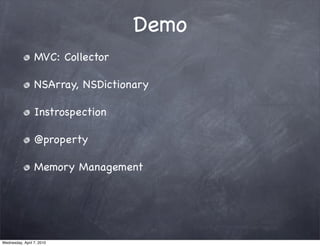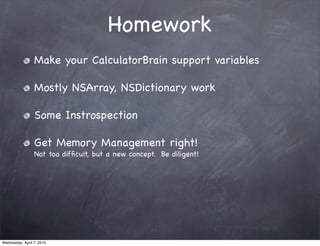The document provides notes from a CS193p class on Wednesday, April 7, 2010. It covers topics including announcements, communication methods, Foundation frameworks like NSArray and NSDictionary, Objective-C concepts like protocols and delegates, memory management using reference counting, and a demo of an MVC collector app. It also lists the homework assignment to add variable support to the CalculatorBrain using Foundation classes and improve memory management.
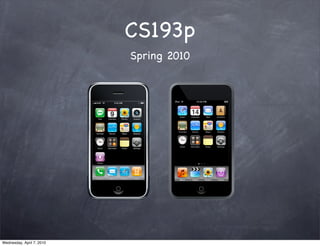

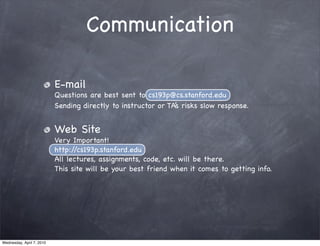
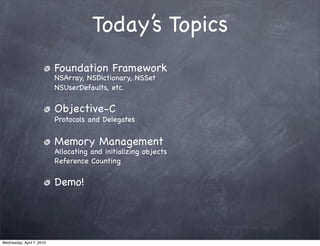
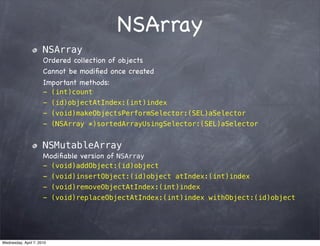
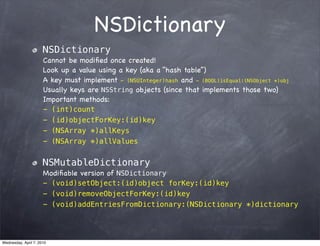
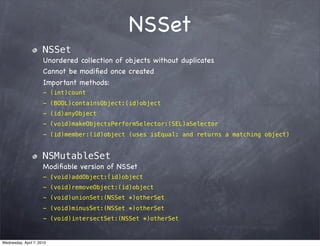
![Enumeration
NSArray of NSString objects
NSArray *myArray = ...; / known to only have NSString objects inside
/
for (NSString *string in myArray) {
double value = [string doubleValue]; / crash if not NSString
/
}
NSArray of id
NSArray *myArray = ...; / no idea what kind of objects are inside
/
for (id obj in myArray) {
< do something with obj here, but make sure you don’t
send it a message it doesn’t respond to >
if ([obj isKindOfClass:[NSString class]]) {
/ send NSString messages to obj with impunity!
/
}
}
Wednesday, April 7, 2010](https://image.slidesharecdn.com/lecture04-100812113137-phpapp01/85/Lecture-04-8-320.jpg)
![Enumeration
NSDictionary’s keys
NSDictionary *myDict = ...;
for (id key in [myDict allKeys]) {
< do something with the key >
}
NSDictionary’s values
NSDictionary *myDict = ...;
for (id value in [myDict allValues]) {
< do something with the value >
}
Wednesday, April 7, 2010](https://image.slidesharecdn.com/lecture04-100812113137-phpapp01/85/Lecture-04-9-320.jpg)
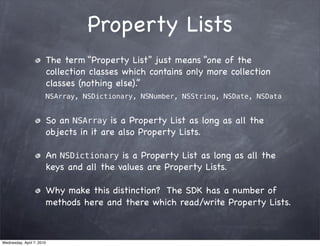
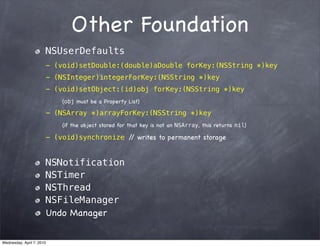
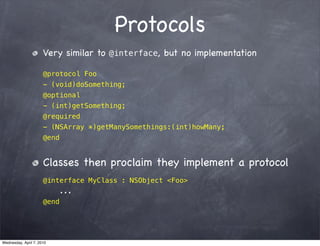
![Protocols
Declaring arguments to require a protocol
- (void)giveMeTheObject:(id <Foo>)anObjectImplementingFoo
Declaring variables to require a protocol
id <Foo> obj = [[MyClass alloc] init];
[obj doSomething]; / will not warn (and should be okay)
/
Compiler will warn of misbehavior
Class says it implements protocol Foo, but doesn’t implement required methods
Assigning an object which does not implement Foo to a variable like obj above
Passing an object which does not implement Foo through an argument
which requires it (like above)
Wednesday, April 7, 2010](https://image.slidesharecdn.com/lecture04-100812113137-phpapp01/85/Lecture-04-13-320.jpg)
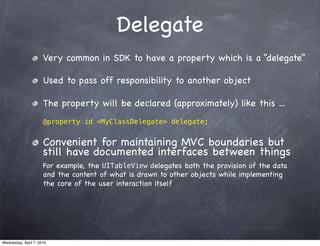
![Creating Objects
Allocating and initializing
Send + (id)alloc to the class
Send appropriate initializer to what you get back
alloc allocates space for the instance variables
Default initializer (for NSObject and subclasses) is
- (id) init
NSObject’ init sets all instance variables to zero
s
Subclasses of NSObject might define new
initializers with more arguments
Initializers with fewer args should call those with more args (usually)
CalculatorBrain *brain = [[CalculatorBrain alloc] init];
UIView *view = [[UIView alloc] initWithFrame:aRect];
UIView *view = [[UIView alloc] init]; / some default frame
/
MyClass *obj = [MyClass alloc]; / ack! no init! don’t do this!
/
Wednesday, April 7, 2010](https://image.slidesharecdn.com/lecture04-100812113137-phpapp01/85/Lecture-04-15-320.jpg)
![Creating Objects
Goofy implementation of initializers
#import <UIKit/UIKit.h> initWithFrame: is UIView’s “designated initializer”
so we, as a subclass, must call it in our DI.
We don’t have to override it, but we should
@implementation MyView if it makes any sense whatsoever to our class.
- (id)initWithFrame:(CGRect)aRect
{
if (self = [super initWithFrame:aRect]) {
/ initialize my class here
/
}
return self;
}
@end
Wednesday, April 7, 2010](https://image.slidesharecdn.com/lecture04-100812113137-phpapp01/85/Lecture-04-16-320.jpg)
![Creating Objects
Asking other objects to create an object for you
NSString *s = [otherString stringByAppendingString:@”hi”];
NSArray *keys = [dictionary allKeys];
NSString *lowerString = [string lowercaseString];
NSNumber *n = [NSNumber numberWithFloat:9.0];
NSDate *date = [NSDate date]; / returns the date/time now
/
Wednesday, April 7, 2010](https://image.slidesharecdn.com/lecture04-100812113137-phpapp01/85/Lecture-04-17-320.jpg)
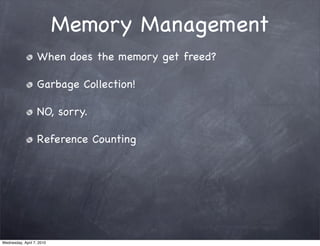
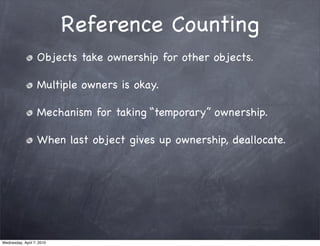
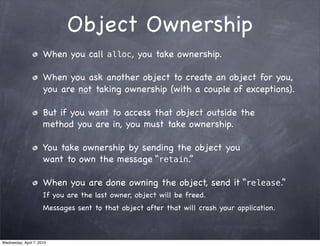
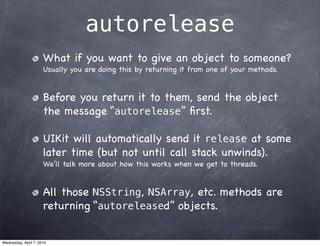
![autorelease
Example
- (Money *)showMeTheMoney:(double)amount
{
Money *theMoney = [[Money alloc] init:amount];
[theMoney autorelease];
return theMoney;
}
Wednesday, April 7, 2010](https://image.slidesharecdn.com/lecture04-100812113137-phpapp01/85/Lecture-04-22-320.jpg)
![autorelease
Example
- (Money *)showMeTheMoney:(double)amount
{
Money *theMoney = [[Money alloc] init:amount];
return [theMoney autorelease];
}
Wednesday, April 7, 2010](https://image.slidesharecdn.com/lecture04-100812113137-phpapp01/85/Lecture-04-23-320.jpg)
![autorelease
Mutable collection class autorelease creators
[NSMutableString string];
[NSMutableArray array];
[NSMutableDictionary dictionary];
Create them, load them up, and return them
- (NSString *)showMeTheMoney:(double)amount
{
NSMutableString *s = [NSMutableString string];
[s appendString:@”The Money:“];
[s appendFormat:@” %g“, amount];
return s;
}
Note there is no autorelease here!
Wednesday, April 7, 2010](https://image.slidesharecdn.com/lecture04-100812113137-phpapp01/85/Lecture-04-24-320.jpg)
![autorelease
Immutable “with” creators
[NSString stringWith... ];
[NSArray arrayWith... ];
[NSDictionary dictionaryWith...];
[NSString stringWithFormat:@”%@ %d”, ...];
[NSArray arrayWithObjects:obj1, obj2, nil];
[NSDictionary dictionaryWithObjectsAndKeys:...];
[NSArray arrayWithContentsOfFile:(NSString *)path];
[NSDictionary dictionaryWithContentsOfFile:...];
[NSString stringWithContentsOfFile:encoding:error:];
Wednesday, April 7, 2010](https://image.slidesharecdn.com/lecture04-100812113137-phpapp01/85/Lecture-04-25-320.jpg)
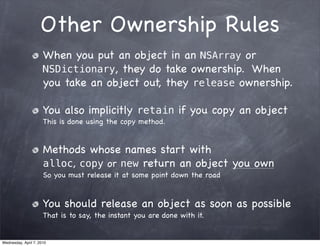
![Deallocation
What happens when the last owner releases?
A special method, - (void)dealloc, is called.
You should override this method and release
any instance variables you own.
And then be sure to call [super dealloc] to
let your superclass release it’s owned objects.
NEVER call dealloc. It is called automatically
when the last owner releases.
Wednesday, April 7, 2010](https://image.slidesharecdn.com/lecture04-100812113137-phpapp01/85/Lecture-04-27-320.jpg)
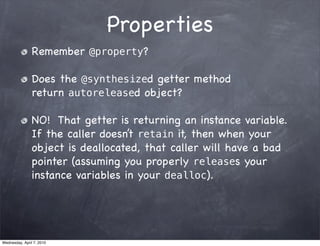
![Properties
Remember @property?
Does the @synthesized setter do a retain when
it is called?
You get to decide:
@property (retain) NSString *name;
@synthesize will create a setter equivalent to this ...
- (void)setName:(NSString *)aString
{
[name release];
name = [aString retain];
}
Wednesday, April 7, 2010](https://image.slidesharecdn.com/lecture04-100812113137-phpapp01/85/Lecture-04-29-320.jpg)
![Properties
Remember @property?
Does the @synthesized setter do a retain when
it is called?
You get to decide:
@property (copy) NSString *name;
@synthesize will create a setter equivalent to this ...
- (void)setName:(NSString *)aString
{
[name release];
name = [aString copy];
}
Wednesday, April 7, 2010](https://image.slidesharecdn.com/lecture04-100812113137-phpapp01/85/Lecture-04-30-320.jpg)
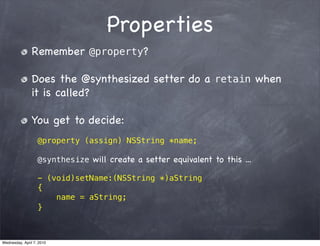
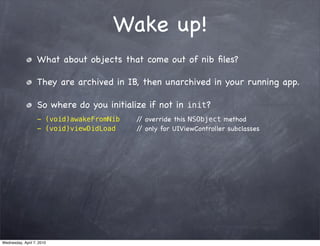
![viewDidUnload
And what about release-ing IBOutlets in UIViewControllers?
Don’t do it in dealloc because your controller’s views are
allowed to be “unloaded” to save memory when not on-screen.
Create @properties (retain) for all of them and then set them
to nil in the method viewDidUnload ...
@property (retain, nonatomic) IBOutlet UILabel *myOutlet;
- (void)viewDidUnload
{
self.myOutlet = nil; / this will release because property is retain
/
[super viewDidUnload]; / probably not necessary unless you think it is
/
}
When/if the view is reloaded, your outlets will get hooked
back up and - (void)viewDidLoad will get called (again).
Wednesday, April 7, 2010](https://image.slidesharecdn.com/lecture04-100812113137-phpapp01/85/Lecture-04-33-320.jpg)
